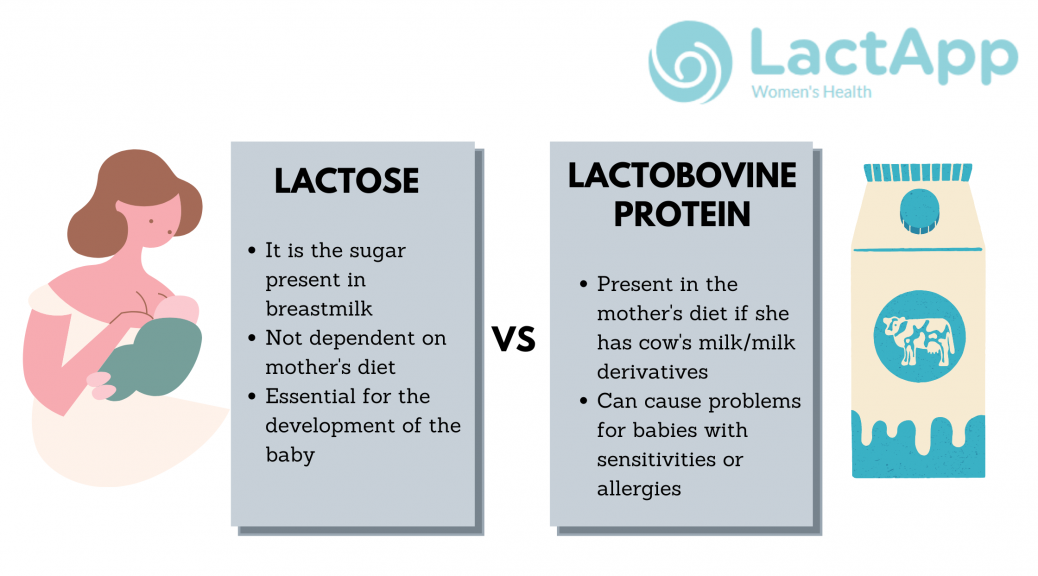
My baby has a milk allergy, do I have to stop breastfeeding?
We have been asked this question incredibly many times and this topic continues to create a lot of confusion. Recent news reports, suggest that many babies are diagnosed incorrectly with milk allergies and this “may also cause harm by discouraging breastfeeding”. If you have the feeling that your baby is more restless and very fussy at the breast, doesn’t let go at all or wants to feed all the time, it could be because of your baby’s growth spurt at 21 days or, later on, your baby’s 3 months growth spurt or even that your baby might have tongue-tie.
So in this post, we would like to go through the topic of milk allergies step by step, to shed light on the issue in order for you to understand it better, should you think your baby and you might be affected.
What is lactose?
Lactose is a carbohydrate present in the milk of mammals. Each mammal has specific milk for the growth of its offspring and each species’ milk has a different composition, adapted to the growth rate and needs of the young. A pig produces very different milk from a bat for example. The more lactose the mammal’s milk contains the larger the young’s brain and the slower and more complex it’s growth.
Lactose accounts for 40% of the total calories in breastmilk. Secondly, there is fats and lastly, in smaller numbers, proteins.
Lactose is a disaccharide (it contains two sugars) when it reaches the baby’s gut and thanks to the lactase enzyme that works in the guts, lactose is broken down. Lactose is transformed into two sugars: glucose and galactose. Glucose gives energy, it is the sugar that makes the body work. Galactose is necessary for the activity of brain cells and helps the central nervous system to function.
And what is lactase?
Lactase is an enzyme present in the small bowel that is responsible for breaking down lactose. Lactase decreases in the gut as we grow older (especially in certain populations), which can lead to some intolerance to ingested lactose.
Are intolerance and allergy the same thing?
No, they are not the same thing. When a person has an allergy to a certain food, their immune system intervenes, perceiving it as an invader, something to defend against, and releases histamines. Reactions occur that can cause symptoms such as breathing problems, throat tightness, coughing, snoring, wheezing, vomiting, stomach pain, hives, swelling or lowering of blood pressure and so on. If the reaction is severe, this can lead to life-threatening reactions. Many allergy sufferers should therefore avoid eating or even coming into contact with the food that triggers the allergic reaction.
When a person suffers from food intolerance, their body cannot assimilate the food correctly, which results in symptoms such as nausea, gas, stomach cramps, diarrhoea and irritability, but these reactions are not triggered by the immune system.
What about lactose allergy?
Lactose allergy does not exist, as we have seen, it is an intolerance. For various reasons ─ which we will see below─ the baby’s body is unable to break down the lactose it receives, which causes varying intestinal discomfort. Lactose is an inseparable part of breastmilk and is absolutely necessary for the growth of the baby. There is nothing we can do to prevent breastmilk from containing lactose as the lactose content of breastmilk is hardly affected at all by the mother’s diet or blood glucose level. Lactose is manufactured within the mammary gland.
So is my baby allergic to my breastmilk?
No, nobody can be allergic to breastmilk, but you can be allergic to a certain element in breastmilk. There are certain proteins from foods that pass into breastmilk and can cause problems for babies with allergies because even a small amount of this substance can cause their immune system to react. When it is found out which specific food causes the allergy, as a mother you can eliminate this from your diet, to prevent it from becoming part of your milk and avoid your baby from having allergic reactions. This is called an exclusion diet and depending on the degree of the baby’s allergy, the diet should be more or less strict.
This way the baby will receive all the benefits of breastmilk while avoiding the allergens that are harmful to her or him.
So, if my baby is lactose intolerant, do I have to stop breastfeeding?
No, it is not necessary that you stop breastfeeding. Primary lactose intolerance occurs usually as we grow older, and does not develop in newborns, because the baby’s growth depends on milk for proper growth.
Secondary intolerance is caused by various illnesses or situations that cause a temporary absence of lactase in the gut: for example diarrhoea or antibiotics. In this case, once the bowel recovers, milk can be consumed again. Breastfed babies who suffer from gastroenteritis or diarrhoea caused by antibiotics should not stop breastfeeding, as breastmilk contains lactose and lactic acid bacteria that help the intestinal flora to recover.
But are there are babies who are not allowed to have breastmilk at all?
Yes, there are babies with a condition called galactosemia, who cannot drink breastmilk, or any other milk containing lactose.
Galactosemia is a very rare congenital disease – those babies are born with it, the condition lasts for life and its origin is genetic, which means it is caused by an error in the DNA sequence and passed on through generations. It is a very rare disease and its occurrence is approximately 1 in every 50,000 people.
If you would like to find out more about any other questions coming up during your breastfeeding journey, download the LactApp app for Android or iPhone to get personalized answers. You can also access our consultation channel with our experts within the app.